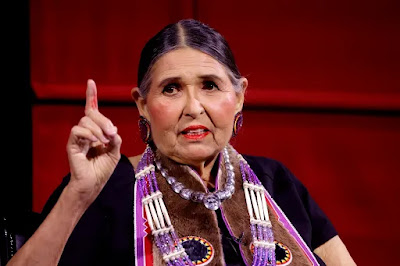 |
| Sacheen Littlefeather |
“Indigenous identity is complicated.
What I do know is that the impact that Sacheen had on myself was very real”
—“The Sacheen Littlefeather controversy highlights a
debate over what it means to be Native American,” CNN, November 5, 2022
“I like you the way you are”
—Avril Lavigne,
Sacheen Littlefeather’s sister says that Sacheen
talked about being native in order to get fame. Yet
her sister is having no trouble denying being native
in order to get fame. Why wait until someone is dead
to have the conversation about their identity?… I know
someone who’s native. Her brother denies being
native. & in his denial, it furthers his belief that
he’s not native. Whereas, his sister—who is native—
goes to native events, is deep friends with native
people, & so she learns more & more about her
native heritage, but when she tries to explain
those connections to her brother, he has no
interest… If Sacheen Littlefeather’s sister
wanted to understand her sister, then she
would have needed to talk to her sister
to find out what her sister knew, knows,
will know. Native is narrative. It is
the stories we unearth, how we grow
by unravelling what is unknown.
A CBS News article I read on
Sacheen Littlefeather said it
reveals the reality of her her-
itage, but it misspelled her
name twice in the article,
listing her as: Sacheen
Littlefather & Sacheen
Littlefield (since
corrected), but it
made me think
how the cloud
outside my
window
right
now
is a
dog,
no,
it’s
a
c
a
t
.
Ron Riekki co-edited Undocumented: Great Lakes Poets Laureate on Social Justice (Michigan State University Press).